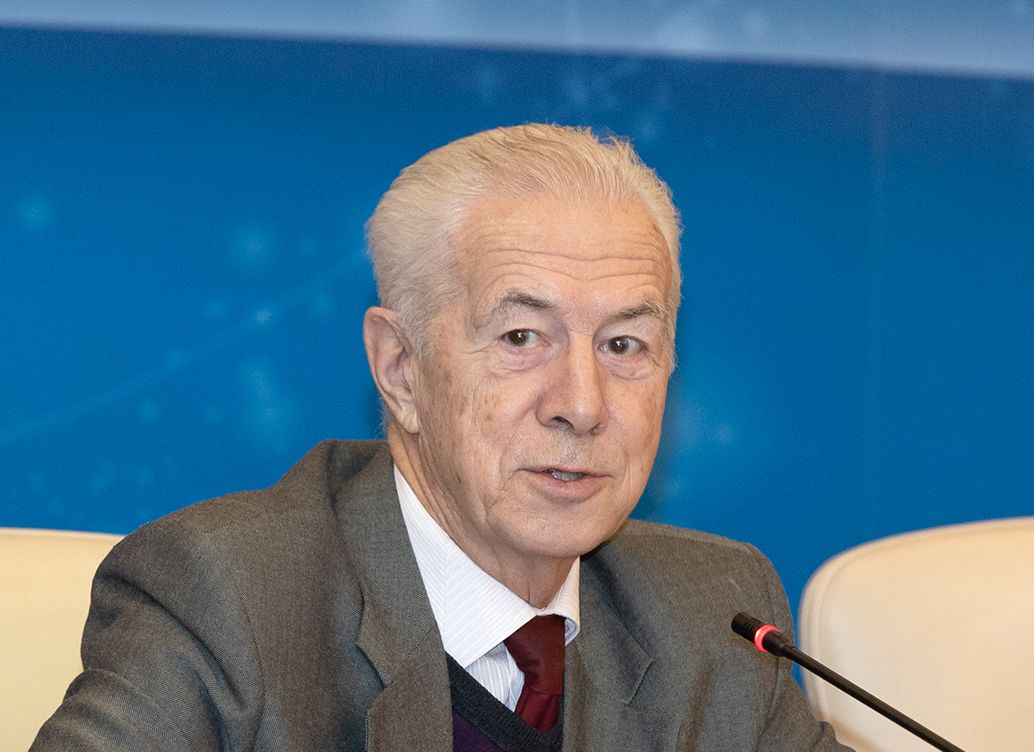Rostislav Jolos turns 80!
News, 11 January 2022
Today, on 11 January 2022, a world-famous theoretical physicist, chief researcher of the Bogoliubov Laboratory of Theoretical Physics, Doctor of Physics and Mathematics, Professor Rostislav Jolos turns 80.
In 1965, R. V. Jolos began his career in Dubna at the Laboratory of Theoretical Physics after graduating from Leningrad State University. Here, at BLTP, he defended his candidate’s thesis in 1968 and his doctoral dissertation in 1976. In 1987, he became the Head of the Sector. Since 2007, he has been working as a chief researcher.
Professor R. V. Jolos is a well-known theoretical physicist, a leading specialist in the fields of theoretical nuclear physics, the author of about 300 scientific papers. Research on the theory of collective nuclear excitations has brought him worldwide fame. These scientific works laid the foundation for new algebraic models in the theory of the nucleus, the most famous of which is the Interacting Boson Model. It is this collective model that allowed studying nuclei from spherical to deformed on a general basis. It is widely used for the interpretation of experimental data on the structure of nuclei.
R. V. Jolos and his students developed a microscopic model of the multi-nucleon transfer reactions in deep-elastic collisions of heavy ions. This model allowed explaining a number of effects in the charge, mass, and energy distributions of reaction products, which are a reflection of the shell structure of nuclei.
Professor Jolos has made a great contribution to the development of a scientific area related to the application of supersymmetry in the theory of the structure of nuclei. Research conducted in this area of nuclear physics can be useful for the development of algorithms for quantum computing.
One of the recent important results of Rostislav Jolos are the development of the collective model for the description of the properties of deformed nuclei with various mass coefficients for different excitation modes confirmed by experimental data and the study of phase transitions between states of the nucleus having different shapes.
Theoretical works in nuclear structure by Professor Jolos have not only fundamental but also practical importance. They are widely used for experimental data analysis, which allows obtaining information about the characteristics of atomic nuclei.
A characteristic feature of his scientific activity is wide cooperation with scientists from other scientific centres. At the invitation of the German Research Foundation, he was a Mercator professor at Justus Liebig University Giessen (Germany), and in 2004, he was awarded the prestigious Humboldt Prize. His long-term cooperation with German physicists contributed to the increase in the international prestige of JINR.
Rostislav Jolos is constantly working on training the scientific personnel. He regularly lectures on nuclear theory, he is widely involved in the organization of scientific conferences and schools. R. V. Jolos is engaged with a great deal of organizational work, he is a member of the editorial board of the journals “Nuclear Physics” and “Physics of Elementary Particles and Atomic Nuclei”. He is a member of Dissertation Councils, a member of the Science and Technology Council of the Bogoliubov Laboratory of Theoretical Physics, and he is Chairman of the JINR Science and Technology Council.
He was awarded an order “Badge of Honor”, a medal “In Memory of the 850th Anniversary of Moscow”, a departmental insignia in labour “Veteran of Nuclear Energy and Industry” for his successful work. He received the titles “Honorary worker of science and high technologies of Russia”, “Honorary Worker of Science and Technology of Russia”, “Honorary employee of JINR”. R. V. Jolos has been awarded the JINR Prize for research in the fields of theoretical physics five times (in 1980, 1992, 1996, 2004 and 2016).
The Directorate of the Institute and the JINR multinational staff congratulate Rostislav Vladimirovich on his 80th jubilee and wish him good health, personal happiness, new bright achievements for the benefit of Russian and world science.
